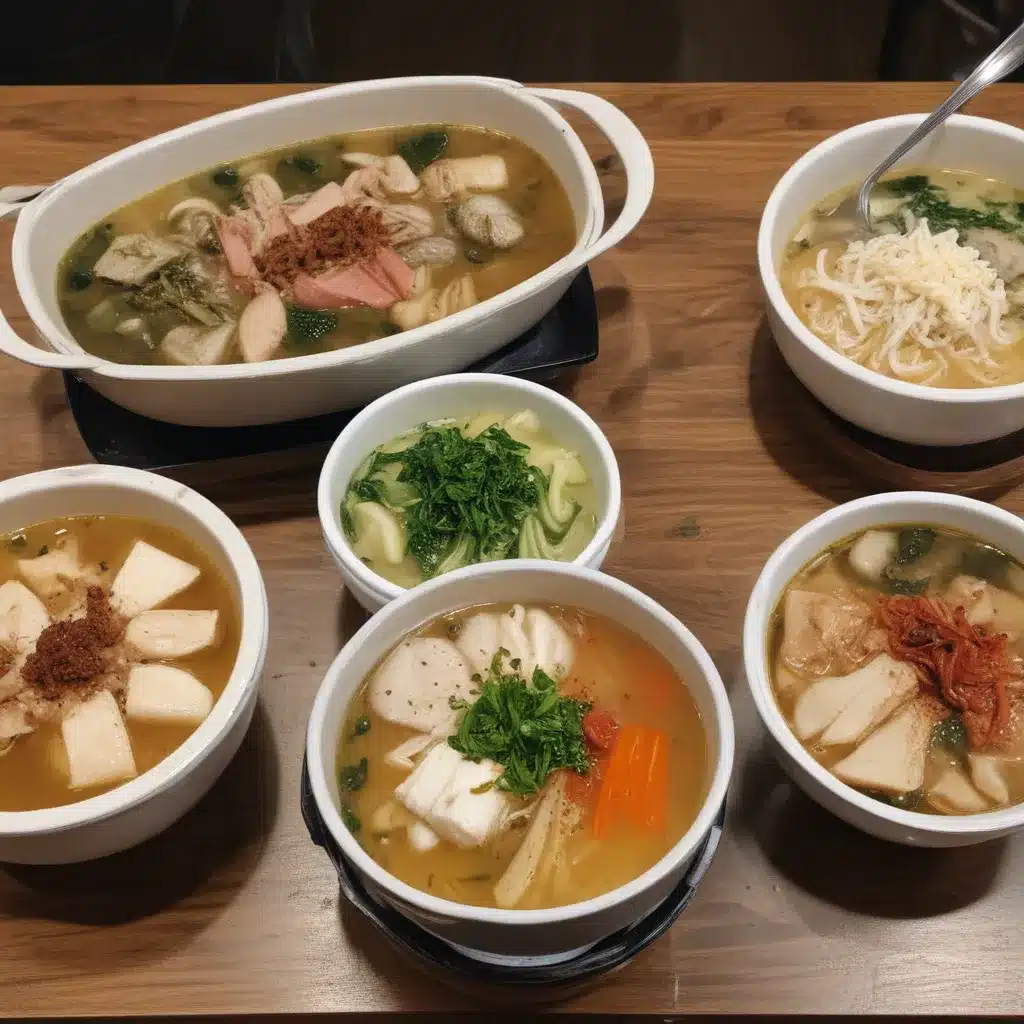
Exploring the Comforting World of Korean Soups
As the crisp, autumn air settles in over the bustling streets of Boston, I find myself increasingly drawn to the warmth and nourishment of Korean soups. These culinary masterpieces, with their rich broths, tender meats, and an array of vibrant, flavorful ingredients, have a way of soothing the soul and fortifying the body.
I must confess, my love affair with Korean cuisine began rather serendipitously. It was on a chilly winter evening, as I was wandering the charming neighborhoods of Koreatown, that the tantalizing aroma of simmering broth lured me off the beaten path and into a cozy little restaurant. The moment I stepped through the door, I knew I was in for something special.
The menu was a treasure trove of enticing options, but it was the section dedicated to Korean soups that immediately piqued my interest. From the hearty and comforting Budae Jjigae, a military-style stew that blends together smoky sausages and kimchi, to the delicate and delicious Miyeokguk, a seaweed soup traditionally served on birthdays, I found myself captivated by the depth of flavors and the stories behind each dish.
Discovering the Diverse Flavors of Korean Soups
As I delved deeper into the world of Korean soups, I was struck by the sheer diversity of these culinary creations. Each soup, it seemed, had its own unique personality, reflecting the rich cultural heritage and the ingenuity of Korean chefs.
One dish that particularly caught my attention was the Samgyeopsal Jjigae, a pork belly stew that showcases the bold and unapologetic flavors of Korean cuisine. The combination of succulent pork, spicy gochujang (Korean red chili paste), and an array of crisp vegetables creates a harmonious balance of textures and tastes that is simply irresistible.
Another standout was the Gomtang, a delicate beef bone broth soup that is often referred to as the “elixir of life.” This soup, with its silky-smooth texture and subtlety seasoned broth, is believed to have restorative powers, nourishing the body and soothing the soul.
As I experimented with different Korean soup recipes, I found myself captivated by the way each dish told a story – a tale of tradition, innovation, and a deep reverence for the natural world. From the earthy and aromatic Doenjang Jjigae, a soybean paste stew that showcases the complexity of Korean fermentation, to the Kongbap, a hearty bean and rice soup that is a staple of Korean temple cuisine, I was constantly amazed by the depth and diversity of these culinary masterpieces.
Uncovering the Health Benefits of Korean Soups
But the allure of Korean soups extends far beyond their tantalizing flavors and rich cultural heritage. As I delved deeper into the world of these culinary wonders, I was struck by the remarkable health benefits they offer.
Many Korean soups are brimming with nutrient-dense ingredients, from the immune-boosting properties of Miyeokguk’s seaweed to the gut-healing powers of the fermented soybean paste in Doenjang Jjigae. These soups are not only comforting and delicious, but they also serve as a veritable “fountain of youth,” nourishing the body and promoting overall well-being.
Take, for instance, the Samgyetang, a ginseng chicken soup that is often referred to as the “ultimate restorative elixir.” This soup, made with tender chicken, ginseng, and a variety of other healing herbs and spices, is believed to have the power to revitalize the body, boost the immune system, and even aid in the prevention of chronic diseases.
As I sipped on the delicate broth of the Samgyetang, I couldn’t help but marvel at the ingenuity of Korean culinary traditions. These soups, with their carefully curated blend of ingredients, not only nourish the body but also nourish the soul, providing a sense of comfort and well-being that can be hard to find in our fast-paced world.
Exploring the Rich Cultural Tapestry of Korean Soups
But the true magic of Korean soups lies not just in their flavors and health benefits, but in the rich cultural tapestry that they so beautifully weave. These culinary creations are not merely dishes to be consumed; they are expressions of Korean identity, a reflection of the country’s history, and a celebration of its vibrant, ever-evolving culinary landscape.
As I delved into the stories behind these soups, I was struck by the way they embodied the resilience and resourcefulness of the Korean people. Take, for instance, the Budae Jjigae, a soup that was born out of the necessity of the Korean War. During this tumultuous time, Korean cooks, faced with scarcity of ingredients, ingeniously repurposed leftover American military rations to create a hearty, flavorful stew that would nourish their communities.
Similarly, the Kongbap, a temple cuisine staple, is a testament to the spiritual and philosophical underpinnings of Korean culture. This simple, yet deeply satisfying soup, made with a variety of beans and grains, reflects the Buddhist principles of mindfulness, sustainability, and respect for the natural world.
Experiencing the Warmth of Korean Soups in Boston
As I continue to explore the world of Korean soups in Boston, I am constantly amazed by the depth and diversity of the culinary offerings. From the bustling Koreatown neighborhoods to the hidden gems tucked away in the city’s quieter corners, I have discovered a veritable treasure trove of soulful, nourishing soups that have become a staple in my culinary repertoire.
One of my personal favorites is the Korean Garden in the heart of Koreatown, where I have had the privilege of savoring some of the most exquisite and authentic Korean soups in the city. The Galbitang, a slow-simmered short rib soup, is a particular standout, with its rich, beefy broth and tender, falling-off-the-bone meat that melts in your mouth.
But the true magic of the Korean Garden lies not just in the quality of its ingredients or the precision of its preparation; it is in the warm, welcoming atmosphere that envelops you the moment you step through the door. The owners, with their genuine hospitality and deep passion for their craft, have created a space that feels like a home away from home, where the worries of the day melt away and you are transported to the heart of Korean culinary tradition.
As I sip on my steaming bowl of Galbitang, surrounded by the lively chatter of the other patrons and the comforting aroma of simmering broth, I am reminded of the powerful role that food can play in bringing people together and nourishing the soul. Korean soups, it seems, are not just a culinary delight, but a testament to the power of community, resilience, and the enduring human spirit.
Embracing the Soulful Comfort of Korean Soups
In a world that often feels increasingly fast-paced and disconnected, the allure of Korean soups has become a beacon of hope and solace for me. These culinary masterpieces, with their rich, comforting flavors and their deep cultural significance, have a way of grounding me, reminding me to slow down, savor the moment, and connect with the broader tapestry of human experience.
As I continue to explore the vibrant Korean soup scene in Boston, I am constantly reminded of the power of food to heal, to nourish, and to bring people together. Whether I am savoring the delicate, earthy flavors of the Doenjang Jjigae or the robust, umami-rich broth of the Budae Jjigae, I am struck by the way these soups have the ability to transcend the boundaries of culture and speak to the universal human experience.
In the end, I believe that the true magic of Korean soups lies not just in their exquisite flavors or their remarkable health benefits, but in their ability to connect us to something deeper – to our shared humanity, to the rhythms of the natural world, and to the enduring traditions that have sustained us for generations. As I continue my culinary journey, I eagerly await the day when I can share these soulful, nourishing delights with friends, family, and fellow food enthusiasts, and together, we can revel in the warmth, the comfort, and the sheer joy that Korean soups have to offer.
